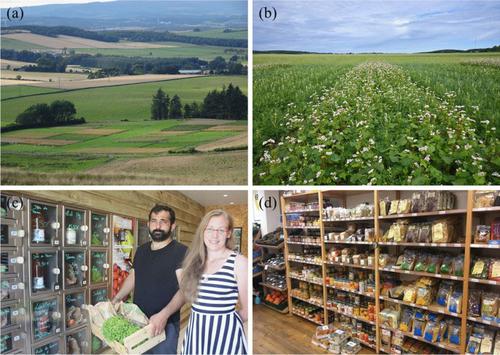Agronomy for Sustainable Development ( IF 6.4 ) Pub Date : 2023-02-14 , DOI: 10.1007/s13593-023-00875-y Pierre Chopin , Alexander Menegat , Göran Bergkvist , Steffen Dahlke , Ortrud Jäck , Ida Karlsson , Marcos Lana , Tove Ortman , Rafaelle Reumaux , Ingrid Öborn , Christine A Watson

|
Organic agriculture and organic food have expanded in recent decades but have undergone conventionalisation. Some claim that this contradicts some or all of the principles of ‘health’, ‘ecology’, ‘fairness’ and ‘care’ established by the International Federation of Organic Agricultural Movement (IFOAM). It is currently unclear how research on organic food/agriculture is structured, whether it embraces these principles, or how key crop diversification, driving sustainability, are addressed. To fill these knowledge gaps, we conducted a bibliometric analysis of 10,030 peer-reviewed articles published from 1945 to 2021 with topic and textual analysis. Our main findings were the following: (1) research is compartmentalised into scales and disciplines, with at field-scale ‘weed’, ‘soil’, ‘pest and disease’ management and ‘livestock farming’ seldom addressed together, or with environmental assessment separated from socioeconomic studies at farm scale. (2) The proportion of publications on ‘consumers’ preferences’ and ‘product quality’ research almost tripled in 20 years, from 10 to 27%, emphasizing the consumer orientation of research on organic agriculture and organic food. (3) Only 4% of articles covered all four IFOAM principles, while associated values such as ‘resilience’, ‘integrity’, ‘equity’, ‘transparency’ and ‘justice’ were even less frequently addressed. (4) Fewer diversification practices have been tested in organic than in conventional agriculture research, with fewer articles on ‘crop mixtures’ or ‘bee-friendly crops’ and a smaller range of legumes considered. (5) Research on genetic improvement and processing of organic legumes is lacking, which could constrain adoption of legumes in organic farming even more than in conventional agriculture. These results indicate a need for increasing interdisciplinary efforts at field level, with systematic measurement of multiple processes (weed-nutrient-pest dynamics). Future studies on organic agriculture should combine several diversification practices and legumes, with relevant indicators addressing the IFOAM values explicitly, and consider the whole value chain by linking producers with consumers.
中文翻译:

从作物多样化的角度看全球有机农业研究中原则和价值观的反映。文献计量学评论
近几十年来,有机农业和有机食品得到了扩展,但经历了传统化。有人声称这违背了国际有机农业运动联合会 (IFOAM) 制定的“健康”、“生态”、“公平”和“关爱”的部分或全部原则。目前尚不清楚有机食品/农业的研究是如何构建的,它是否包含这些原则,或者如何解决关键作物多样化,推动可持续性。为了填补这些知识空白,我们对 1945 年至 2021 年发表的 10,030 篇同行评议文章进行了文献计量分析,包括主题和文本分析。我们的主要发现如下:(1) 研究被划分为不同的规模和学科,在田间规模的“杂草”、“土壤”、“病虫害”管理和“畜牧业”很少一起解决,或者与农场规模的社会经济研究分开进行环境评估。(2) 关于“消费者偏好”和“产品质量”研究的出版物比例在 20 年内几乎增加了两倍,从 10% 增加到 27%,强调有机农业和有机食品研究的消费者导向。(3) 只有 4% 的文章涵盖了 IFOAM 的所有四项原则,而诸如“弹性”、“诚信”、“公平”、“透明度”和“正义”等相关价值观的提及频率更低。(4) 与传统农业研究相比,在有机领域测试的多样化实践更少,关于“作物混合物”或“蜜蜂友好型作物”的文章更少,考虑的豆类范围更小。(5) 缺乏对有机豆类遗传改良和加工的研究,这可能比传统农业更能限制豆类在有机农业中的应用。这些结果表明需要在实地层面增加跨学科的努力,对多个过程(杂草-营养-害虫动态)进行系统测量。未来对有机农业的研究应结合多种多样化做法和豆类,以及明确解决 IFOAM 价值的相关指标,并通过将生产者与消费者联系起来来考虑整个价值链。系统测量多个过程(杂草-养分-害虫动态)。未来对有机农业的研究应结合多种多样化做法和豆类,以及明确解决 IFOAM 价值的相关指标,并通过将生产者与消费者联系起来来考虑整个价值链。系统测量多个过程(杂草-养分-害虫动态)。未来对有机农业的研究应结合多种多样化做法和豆类,以及明确解决 IFOAM 价值的相关指标,并通过将生产者与消费者联系起来来考虑整个价值链。











































 京公网安备 11010802027423号
京公网安备 11010802027423号